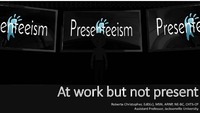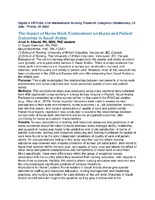| dc.contributor.author | Christopher, Roberta | en |
| dc.date.accessioned | 2016-03-17T11:56:39Z | |
| dc.date.available | 2016-03-17T11:56:39Z | |
| dc.date.issued | 2016-03-17 | |
| dc.identifier.uri | http://hdl.handle.net/10755/601500 | en |
| dc.description | <p>Caring for a Diverse World</p> | en |
| dc.description.abstract | <p>Have you ever been physically at work, but not fully present? This is called presenteesim. How might this lack of presence impact your safety, your patient's safety, and the quality of your nursing care? To better understand the relationship the relationship of presenteeism with absenteeism, nurse safety outcomes, and quality of nursing care, as perceived by nurses a quantitative research study was undertaken. This presentation will discuss key findings from the study. A description of patient safety outcomes, personal and contextual factors, and well-being assessment for productivity, which may influence presenteeism, absenteeism, nurse safety outcomes, and quality of nursing care will be discussed. The study to be discussed included a sample of 244 of actively licensed nurses working in direct patient care at two large academic medical centers located in northeast Florida. Data were gathered using a self-administered online survey. Study findings suggest there is a statistically significant positive relationship between presenteeism and quality of nursing care, a statistically significant negative relationship between presenteeism and absenteeism, and a statistically significant, negative difference in the proportion of nurses reporting presenteeism who experience the well-being work-related barrier of “lack of sufficient training.” Moreover, this study found a significant difference in the proportion of nurses reporting presenteeism who work in acute care healthcare facilities when compared to those who work in psychiatric healthcare facilities, and in the nurses reporting presenteesim who work in the critical care nursing specialty when compared to those who work in the psychiatric nursing specialty. There was no statistically significant relationship between presenteeism and nurse safety outcomes. A well-being learning approach to presenteeism for nurses provides a useful framework for the design, implementation, and evaluation of evidence-based interventions to reduce nurse presenteeism and absenteeism, enhance nurse and patient safety, and improve quality of care.</p> | en |
| dc.format | Text-based Document | en |
| dc.language.iso | en_US | en |
| dc.subject | Presenteeism | en |
| dc.subject | Safety Outcomes | en |
| dc.title | At work - But not present | en |
| dc.type | Presentation | en |
| dc.rights.holder | <p>
All rights reserved by the author(s) and/or publisher(s) listed in this item record unless relinquished in whole or part by a rights notation or a Creative Commons License present in this item record.
</p><p>
All permission requests should be directed accordingly and not to the Sigma Repository.
</p><p>
All submitting authors or publishers have affirmed that when using material in their work where they do not own copyright, they have obtained permission of the copyright holder prior to submission and the rights holder has been acknowledged as necessary.
</p> | |
| dc.type.category | Full-text | en |
| dc.evidence.level | N/A | en |
| dc.research.approach | N/A | en |
| dc.contributor.department | Lambda Rho at-Large | en |
| dc.author.details | Roberta Christopher, Ed.D(c), MSN, ARNP, NE-BC, CHTS-CP | en |
| dc.conference.name | STTI Lambda Rho Chapter’s 2016 Nursing Research Conference | en |
| dc.conference.host | Lambda Rho at-Large Chapter of Sigma Theta Tau International Honor Society of Nursing | en |
| dc.conference.location | Jacksonville, Florida, USA | en |
| dc.date.conferenceyear | 2016 | |
| dc.description.reviewtype | Abstract Review Only: Reviewed by Event Host | en |
| dc.description.acquisition | Proxy-submission | en |





